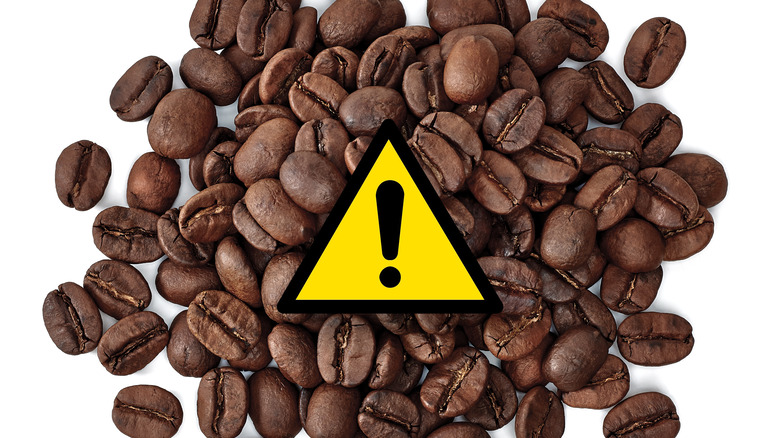What Is Acrylamide And Is It Bad If You See It In Your Coffee?
Few things are more relaxing than drinking a freshly brewed cup of coffee in the morning. This delicious beverage awakens your senses, increases your energy, and gets you ready for the day. Plus, it's rich in bioactive compounds that may protect against heart disease, diabetes, stroke, depression, and even cancer, according to a 2018 review published in the journal Progress in Cardiovascular Diseases. Drinking just 3-4 cups of java per day is enough to reap the benefits. Even so, there is some concern regarding acrylamide in coffee.
This chemical can form when foods are cooked at high temperatures, explains the U.S. Food and Drug Administration (FDA). Fried, roasted, or baked potatoes and other plant-based foods — especially grains and starches — tend to contain more acrylamide than meat, fish, or dairy. The coffee roasting process uses high heat, too, leading to acrylamide formation. Therefore, this compound can be found in any caffeinated product made from roasted coffee beans, notes MedicalNewsToday. The same goes for roasted chicory and other coffee substitutes.
But what is acrylamide and how does it affect your health? Should you stop drinking coffee because of it? The answer depends on who you ask. Here's what you should know about this compound and its risks.
The truth about acrylamide, a chemical in roasted coffee beans
In 2017, California's Office of Environmental Health Hazard Assessment (OEHHA) published Proposition 65, a list of potentially dangerous chemicals. Acrylamide was classified as a carcinogen and developmental toxin. Two years later, researchers said that the acrylamide in coffee is unlikely to cause cancer. "We found coffee is a complex mixture of numerous chemicals that includes both known carcinogens but also some anti-carcinogens that protect against cancer, including antioxidants," explained Sam Delson, the deputy director at OEHHA, in an interview with Business Insider.
Most coffee brands contain negligible doses of acrylamide and therefore are unlikely to increase cancer risk. A typical cup of coffee delivers about 0.45 micrograms of this compound (per the Annals of the National Institute of Hygiene). The tolerable daily intake of acrylamide is 2.6 micrograms per kilogram of body weight, meaning that a 160-pound person can safely consume approximately 182 micrograms per day, according to the journal Bakery and Snacks. Simply put, it's impossible to consume too much acrylamide from coffee alone.
Pastries, fries, potato chips, burnt food, and coffee substitutes are much higher in acrylamide than regular coffee. For example, bread rolls contain around 446 micrograms per kilogram, while most types of coffee don't exceed 288 micrograms per kilogram (per Carcinogenesis). Based on these findings, there's no need to quit your morning cup of joe. "Studies in humans suggest that if anything, coffee is protective for some types of cancer," epidemiologist Amy Trenton-Dietz told CBS News.


